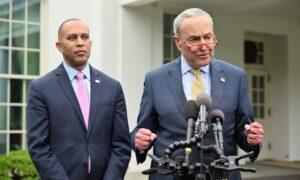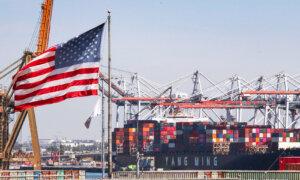Navarro said the ‘de minimis’ rule allowed China to exploit a loophole to smuggle fentanyl and other drugs into the United States.
WASHINGTON—Peter Navarro, White House senior counselor for trade and manufacturing, defended the Trump administration’s use of tariffs on Mexico, Canada, and China to curb the flow of fentanyl into the United States.
“The president is fighting a drug war. This is not a trade war,” Navarro said on Tuesday during a Politico Playbook event.
He stated that because of tariffs, the administration has seen a quick response in terms of collaboration from both Mexico and Canada.
On Feb. 1, President Donald Trump signed an executive order imposing a 25 percent tariff on all non-energy imports from Canada and a 10 percent tariff on energy imports, effective from Feb. 4. In separate executive orders, the president imposed a 25 percent tariff on all imports from Mexico and an additional 10 percent tariff on all imports from China.
On Feb. 3, Trump said he would pause tariffs on Canada and Mexico for a month after reaching an agreement with both countries to address the border crisis.
Mexican President Claudia Sheinbaum announced that she has agreed to send 10,000 soldiers to the U.S.–Mexico border to help combat the influx of fentanyl and illegal immigrants.
Following a phone call with Trump the same day, Canadian Prime Minister Trudeau announced that the Canadian government would implement a $1.3 billion border plan. He has also committed to appointing a new fentanyl czar and launching a Canada–U.S. joint strike force to combat organized crime, fentanyl, and money laundering.
The 10 percent tariff on Chinese goods remains in place. Trump said earlier that he would discuss the matter with Chinese leader Xi Jinping.
Navarro said that Trump’s trade team is “going through a checklist” of measures, making sure to track the progress.
The Mexican drug cartels are rapidly expanding in Canada, Navarro said, highlighting the growing threat to the United States.
He also pointed out that the de minimis rule exempts from tariffs all goods worth $800 or less that cross U.S. borders.
“What the cartels in China have done is to exploit that loophole to smuggle in not just fentanyl but all sorts of drugs,” Navarro said.
On Feb. 1, Trump signed several executive orders to cancel the “de minimis exemption” for all goods imported from Canada, Mexico, and China.
Removing the de minimis standard means that goods of any value will be subject to all duties assessed by the United States.
On Tuesday, China imposed counter-tariffs on multiple U.S. products and announced an investigation of Google.
Navarro didn’t comment on Beijing’s retaliation against the new U.S. tariffs.
“I never get ahead of the boss,” Navarro said, referring to Trump’s planned conversation with Xi.
“Let’s see what happens.”
Speaking at the Politico event, Rep. Linda Sanchez (D-Calif.), ranking member of the House Ways and Means trade subcommittee, said Trump’s tariffs won’t stop fentanyl from coming into the country.
“It’s performative. It’s theatrical,” she said. “In effect, it’s spooking the markets, and it’s creating uncertainty.”
Sanchez, however, acknowledged that 90 percent of fentanyl in the country is coming from packages entering under the de minimis standard.
She approved Trump’s order to prevent these packages from entering the country duty-free but said the action is temporary.
“In order for it to be permanent,” she said, “Congress needs to act because that is our jurisdiction.”
Speaking at the event, Rep. Adrian Smith (R-Neb.), chairman of the Ways and Means trade subcommittee, said that while he is not a fan of tariffs, he praised the response coming from Canada and Mexico to cooperate to resolve the fentanyl crisis.
Original News Source Link – Epoch Times
Running For Office? Conservative Campaign Consulting – Election Day Strategies!


